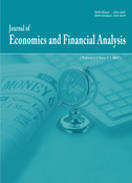URI: https://ojs.tripaledu.com/jefa/article/view/94/104
Fiscal Councils and Creative Accounting in EU Member States
Abstract
Keywords
JEL Classification
Full Text:
References
Alt , J., Lassen, D. , & Wehner, J. (2014). It isn’t just about Greece: Domestic policy, transparency and fiscal gimmickry in Europe. British Journal of Political Science, 44, 707–716.
Armingeon, K., Careja, R., Engler, S., Potolidis, P., Gerber, M., & Leimgruber, P. (2010). Comparative political dataset III. Institut für Politikwissenschaft, Universität Bern.
Beck, T., Clarke, G., Groff, A., Keefer, P., & Walsh, P. (2001). New tools in comparative political economy: The database of political institutions. World Bank Economic Review, 15, 165–176.
Dafflon, B., & Rossi, S. (1999). Public accounting fudges towards EMU: A first empirical survey and some public choice considerations. Public Choice, 101, 59–84.
European Commission (2003). Public finances in EMU 2003. European Economy 3/2003. Publications Office of the European Union, Luxembourg.
European Commission (2011). Public finances in EMU 2011. European Economy 3/2011. Publications Office of the European Union, Luxembourg.
Kam, C., & Franzese, R. (2007). Modelling and interpreting interactive hypothesis in regression analysis. University of Michigan Press.
Koen, V., & van den Noord, P. (2005). Fiscal gimmickry in Europe: One-off measures and creative accounting, OECD Economics Department Working Paper.
Milesi-Ferretti, G.M. (2003). Good, bad or ugly?: On the effects of fiscal rules with creative accounting. Journal of Public Economics, 88, 377–394.
Milesi-Ferretti, G., & Moriyama, K. (2004). Fiscal adjustment in EU countries: A balance sheet approach. IMF Working Paper.
Rose, S. (2006). Do fiscal rules dampen the political business cycle?. Public Choice, 128, 407–431.
Von Hagen, J. (1991). A note on the empirical effectiveness of formal fiscal restraints. Journal of Public Economics, 44, 199–210.
Von Hagen, J., & Harden, I. (1996). Budget processes and commitment to fiscal discipline. IMF Working Paper.
Von Hagen, J., & Wolff, G.B. (2006). What do deficits tell us about debt?: Empirical evidence on creative accounting with fiscal rules in the EU. Journal of Banking and Finance, 30, 3259–3279.

This work is licensed under a Creative Commons Attribution-NonCommercial-NoDerivatives 4.0 International License.


